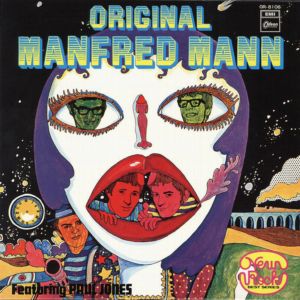
- Format: MP3

Japan 24-Bit Remaster
Manfred Mann was a British Beat, R&B and pop band of the 1960s, named after its South African keyboard player and founder, who later led the successful 1970s follow-on group Manfred Mann's Earth Band.
The Mann-Hugg Blues Brothers (as the band were originally called) were formed in London in December 1962 by keyboard player Manfred Mann and drummer/vibes player Mike Hugg. Born out of the British blues boom then sweeping London's clubs (which also spawned such luminaries as the Rolling Stones and the Yardbirds), the band was completed by Mike Vickers on lead guitar, Dave Richmond on bass, and Paul Jones fronting as lead vocalist and harmonica player; by this point, they had changed their name into Manfred Mann & The Manfreds. Gigging constantly throughout late 1962 and early 1963, the band soon attracted attention for their distinctive sound propelled by Mann's keyboards, Jones' soulful vocals and an occasional horn section. The group signed to HMV Records in March 1963 after a change of name to Manfred Mann (at the suggestion of their label's producer), and debuted in July of that year with the jazzy instrumental single "Why Should We Not?", which failed to chart, as did the follow up (with vocals this time), "Cock-A-Hoop"
In 1964 the group was asked to provide a new theme tune for the ITV pop music TV series Ready Steady Go!. They responded with the energetic "5-4-3-2-1" which, with the help of weekly TV exposure, rose to No.5 in the UK charts. It was shortly after "5-4-3-2-1" was recorded that Richmond left the band,[1] being replaced by Tom McGuinness - the first of many line-up changes. After a further self-penned hit ("Hubble Bubble (Toil And Trouble)") the band struck gold with "Do Wah Diddy Diddy", a cover of a minor hit earlier that year by the Exciters. The track, which showcased Jones' powerful singing, reached the top of both the UK and U.S. charts (The Exciters version had only charted #78 in the U.S.).
During 1965 the group continued to have hits with both self-penned and cover material, their sound increasingly moving away from the blues-based music of their early years to a highly successful pop-soul hybrid. Notably the group began to have success with interpretations of Bob Dylan songs, including "With God on Our Side" as a track on a best-selling EP. They also reached No.2 in the UK with the controversial "If You Gotta Go, Go Now", which was banned or edited by a number of TV and radio stations. Prior to this latter release, Paul Jones announced his intention to quit the band for a solo career once a replacement could be found.
Jones stayed with the band for one more year, during which time Mike Vickers was replaced by Jack Bruce of John Mayall's Bluesbreakers (long enough to play bass on the band's second UK No.1 single "Pretty Flamingo"). Jones was eventually replaced by Mike d'Abo - among those on the shortlist was Rod Stewart - and this was one of the few occasions when a band has successfully swapped lead singers and remained at the top. Jack Bruce left to form Cream and was replaced by Klaus Voorman (a longtime Beatles associate), with McGuinness moving to guitar. To complete the changes, the group switched labels to Fontana Records.
With d'Abo as vocalist, the group pursued a softer acoustic pop sound, with a tinge of Dylanesque social comment and surrealism in the lyrics. Their first Fontana Records single was in fact a Dylan cover, "Just Like A Woman", and the group went on to score their biggest hit for two years with a cover of his "Mighty Quinn".